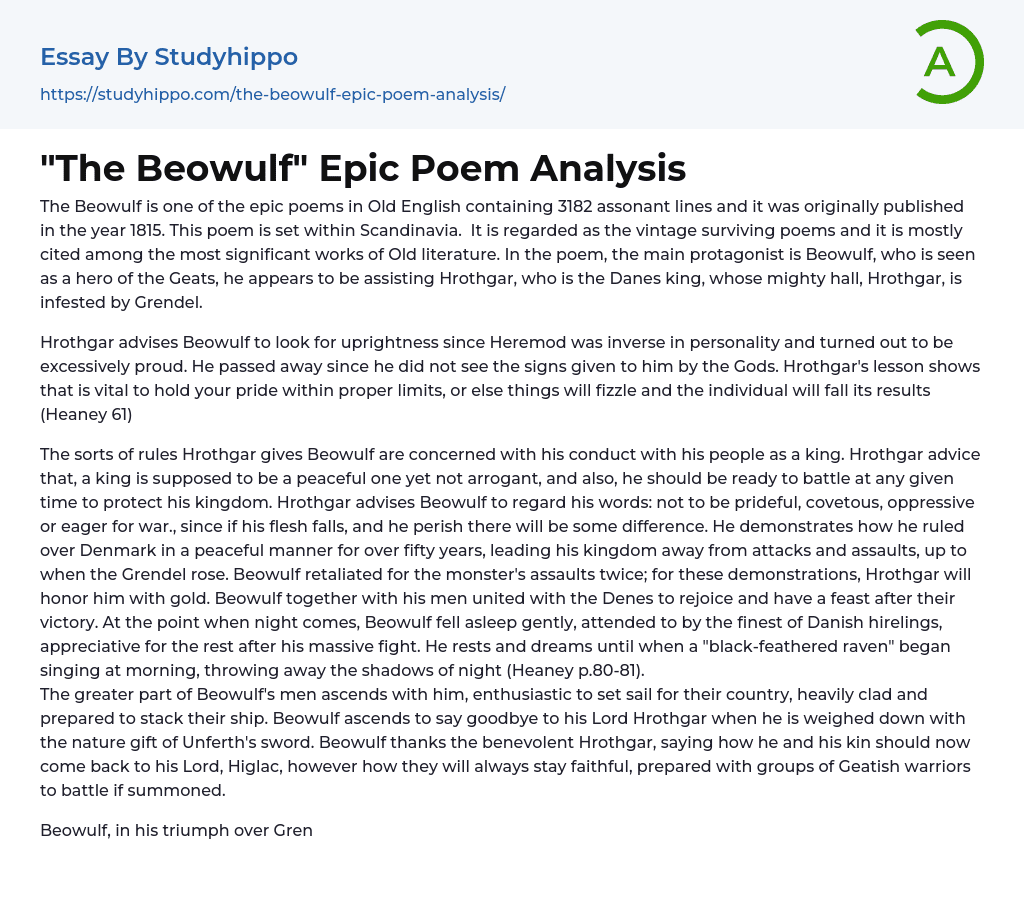The Beowulf is one of the epic poems in Old English containing 3182 assonant lines and it was originally published in the year 1815. This poem is set within Scandinavia. It is regarded as the vintage surviving poems and it is mostly cited among the most significant works of Old literature. In the poem, the main protagonist is Beowulf, who is seen as a hero of the Geats, he appears to be assisting Hrothgar, who is the Danes king, whose mighty hall, Hrothgar, is infested by Grendel.
Hrothgar advises Beowulf to look for uprightness since Heremod was inverse in personality and turned out to be excessively proud. He passed away since he did not see the signs given to him by the Gods. Hrothgar's lesson shows that is vital to hold your pride within proper limits, or else things will fizzl
...e and the individual will fall its results (Heaney 61)
The sorts of rules Hrothgar gives Beowulf are concerned with his conduct with his people as a king. Hrothgar advice that, a king is supposed to be a peaceful one yet not arrogant, and also, he should be ready to battle at any given time to protect his kingdom. Hrothgar advises Beowulf to regard his words: not to be prideful, covetous, oppressive or eager for war., since if his flesh falls, and he perish there will be some difference. He demonstrates how he ruled over Denmark in a peaceful manner for over fifty years, leading his kingdom away from attacks and assaults, up to when the Grendel rose. Beowulf retaliated for the monster's assaults twice; for these demonstrations, Hrothgar will honor him with gold. Beowulf together with
his men united with the Denes to rejoice and have a feast after their victory. At the point when night comes, Beowulf fell asleep gently, attended to by the finest of Danish hirelings, appreciative for the rest after his massive fight. He rests and dreams until when a "black-feathered raven" began singing at morning, throwing away the shadows of night (Heaney p.80-81).
The greater part of Beowulf's men ascends with him, enthusiastic to set sail for their country, heavily clad and prepared to stack their ship. Beowulf ascends to say goodbye to his Lord Hrothgar when he is weighed down with the nature gift of Unferth's sword. Beowulf thanks the benevolent Hrothgar, saying how he and his kin should now come back to his Lord, Higlac, however how they will always stay faithful, prepared with groups of Geatish warriors to battle if summoned.
Beowulf, in his triumph over Grendel, has changed Danes and Geats, once severe adversaries, into quiet brothers, prepared to battle next to each other. Hrothgar guarantees Beowulf that as long as he is King, he will witness the Danes welcoming the Geats warmly, open mead-halls, and treasure gifts. He gives Beowulf twelve more golden fortunes, crying in his maturity in recognition of the high that Beowulf as conveyed to his kin and his kingdom.
Beowulf together with his men maintained ship with gold, horses, and weapons and then sailed for Geatland. They traveled via the waves and wind until when they reached Geatish shores welcome them out there. The Geats Ashore rushed to meet them, cheerful to see the dearest warriors’ reoccurrence in the flesh. Beowulf and his men assemble their gold and treasure and
walk to the Lord Higlac's corridor, introducing the treasure to the Lord they are loyal to (Heaney 94).




